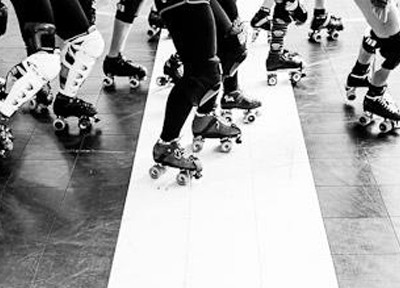
In the last two Mental Muscle posts we met two Roller Derby Athletics members, Sara and Chelsea, who shared with us what diverts their attention and the refocusing plans that help keep them on track. Both these athletes were faced with distractions that had a harmful impact on their performances and general actions:
- Sara‘s distraction came when she needed to impact a defensive formation or was stuck behind one. During these moments she would be caught up in feeling anxiety, panic, and disappointment.
- Chelsea‘s distraction came from moments where she lost control of her emotions. This happened when she felt her boundaries had been passed or ignored.
Both of them formulated refocusing plans – routines they can swiftly and easily implement whenever they get caught up in their distractions. The goal is to shift focus from any distractions and move it towards the present moment. Their refocusing plans included mental skills including relaxation techniques, positive self-talk, and imagery.
In this Mental Muscle post, Sara and Chelsea reflect on the experience of creating their Refocusing Plans, as well as working with a mental performance coach.
Was this the first time you worked with a mental performance coach?
Sara: This was the third time I worked with a mental performance coach, but this was the first time I had a one-on-one, roller derby specific mental performance coaching session.
Sara isn’t new to the concept of mental performance. On top of already consulting with a mental performance coach, she likes to read up on mental performance and sports psychology. Alternatively, Chelsea is new to using mental performance in sports.
Chelsea: Yes, this was my first time working with a mental performance coach.
Describe your experience in the session and/or creating a refocusing plan? What was the biggest challenge that you faced when creating your refocusing plan?
Sara: The session really helped. The refocusing plan gave me confidence that I could stay calm and focused in these situations. For example, if the other jammer got the lead I was more focused on the plan than my feelings. It was great to get help and tools for the specific situations I had problems dealing with on my own. The experience made me confident and calm.
Since Sara has already used mental skills to enhance her performance, she found it easier to add these components into her plan. For example she uses imagery at the start line, so it was easy for her to implement that technique in her refocusing plan. She’s also had experience of engaging in breathing techniques (relaxation technique) to calm herself down. Sara’s challenges came from conquering specific cues/ moments in the game.
Chelsea: I found the session unbelievably helpful. I think it’s a game changer already in my personal life, and it will make my derby experience more satisfying. The biggest challenge was the creative block I had in working out how to turn things around, which is where Jess came in with her excellent ideas.
For both Sara and Chelsea, their biggest challenge was taking the tools they had and putting them into a plan. Bouncing ideas and being asked reflective questions helped both of these athletes to create their own plans for refocusing.
Did you have a chance to put your Refocusing Plan into action? How did it go? Did you modify your plan in any way?
Sara: I used my refocusing plan during one training session and a couple of bouts. During these I didn’t get any panic feelings and my thoughts were clear. I didn’t modify my plan in any way; at the moment it’s meeting my needs.
Chelsea: I absolutely have! I’ve used it a lot in my everyday life. Asking “Why now?” when I start to feel overwhelmed shuts off the overwhelming emotion and engages my curious logical brain. Inevitably, I have a need to articulate. It’s helped me communicate clearly with my girlfriend, and I have no doubt it will help me avoid feeling overwhelmed at training and in games.
Did you learn anything about yourself during the session?
Sara: I learned I’m a person who is receptive to my feelings. It’s easy for me to get quiet but if I don’t focus on talking to myself and on what I need to do, then my feelings are guiding my decisions. I also realised I’ve been doing refocusing before, but not as specific as the plan as I have now. This makes it easier to take my new plans and put them into action. With Jess, I got more focused and could narrow in on the issues that I had on the track. I’ve been using these tools in my everyday life too, and will definitively keep on using them and the plans in the future as well.
Chelsea: I learned I’m scared of conflict and that my body reacted to all potential conflicts with a fight or flight response. This technique if asking “Why now?” has helped me short-circuit the vicious cycle.
It’s important to remember that learning and personal growth come from different areas of our lives, not necessarily just your own personal experiences – You can learn a lot from the experiences of others. Hopefully, Sara and Chelsea’s stories and reflections have given you an insight into the challenges we face as athletes. No one is the same. Even if you have a similar distraction as a teammate, it doesn’t mean you’ll both react to it in the same way or have the same refocusing plan. Therefore, create a plan, implement it in practices and games, and monitor your progress. If changes need to be made, then make them and repeat the process.
Remember this refocusing plan is for you. You are the only one that can control your own thoughts and mind frame. Taking control and strengthening your focusing skills will only make you a stronger athlete.

 Cross-Training for Roller Derby: A Primer
Cross-Training for Roller Derby: A Primer  Pre-Hab: How to Engage Your Core
Pre-Hab: How to Engage Your Core  How to Improve at Derby’s 27 Laps Test
How to Improve at Derby’s 27 Laps Test  Prehab! Feet and Ankles
Prehab! Feet and Ankles  Stop sucking. Start winning.
Stop sucking. Start winning.